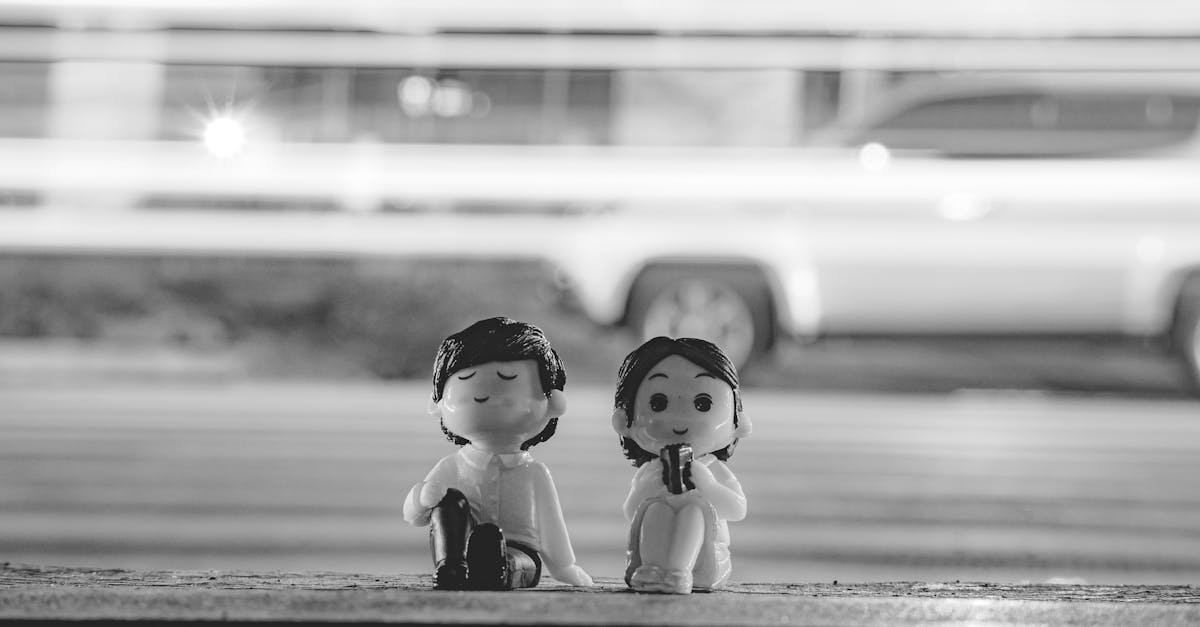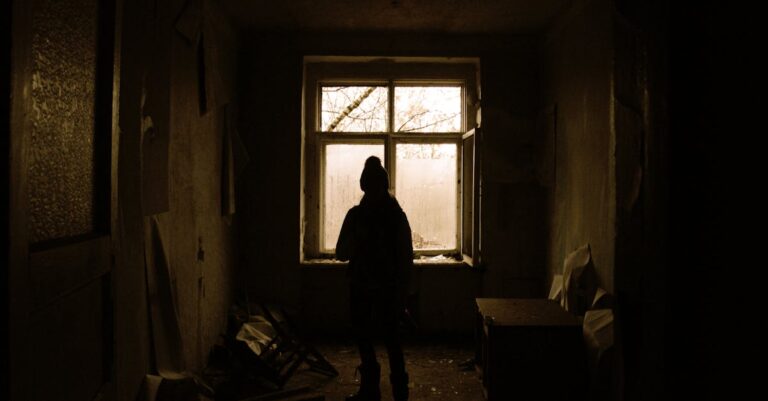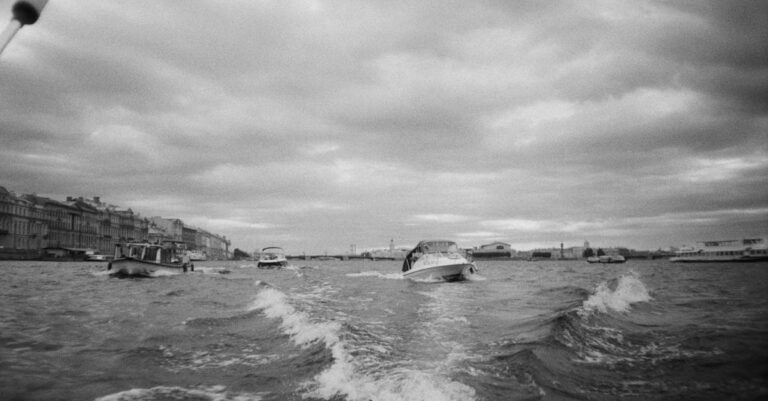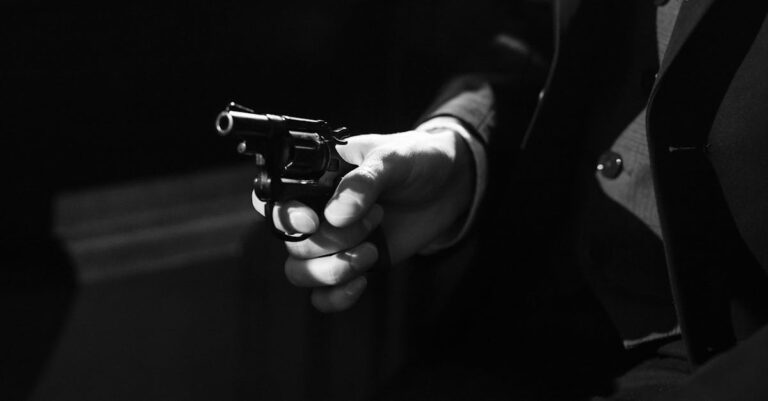
The diner’s neon sign flickered like a dying heartbeat, casting a pink glow over the cracked pavement. Clara wiped the counter with a rag that smelled of burnt coffee and regret, her fingers tracing the same groove in the wood where she’d leaned for years. The bell above the door jingled, and she didn’t look up—until the scent of rain-soaked earth and something sharper, like gunpowder, hit her nostrils.\n\n”Black coffee, no sugar,” the man said. His voice was low, roughened by cigarettes and sleepless nights. She glanced at him then, just enough to see the shadow of a scar along his jawline, the way his boots caked with mud from the trail behind the diner.\n\n”That’ll be a dollar twenty,” she said, keeping her tone flat. The man didn’t react, just slid into the booth across from her, his eyes lingering on the faded photo of a woman in a red dress that hung above the cash register. Clara’s throat tightened. She’d never asked how the photo got there, only that it stayed.\n\nHe ordered a sandwich, but she knew he wasn’t here for food. The way he studied the menu, his fingers tapping a rhythm on the table, told her he was waiting for something—or someone. She turned back to the counter, pretending to polish glasses, but her ears stayed tuned to the scrape of his chair, the rustle of his jacket.\n\nWhen he spoke again, it was to ask about the town. Clara hesitated, then listed the basics: the old mill, the church with its crooked steeple, the cemetery where the dead were buried with their faces up so they could watch the sky. The man nodded, but his eyes didn’t meet hers.\n\nBy the time he left, the sun had dipped behind the hills, and the diner was empty except for the two of them. Clara waited until his car disappeared down the road before she reached under the counter, pulling out a photo of her own—a younger version of herself, smiling beside a man who no longer lived. She pressed it to her chest, the edges frayed from too many tears.\n\nThe next morning, the man was back. This time, he wore a leather jacket and a hat that shadowed his face. He didn’t order coffee. Instead, he slid into the booth and said, “I need to find someone.”\n\nClara didn’t look up from her mop. “That’s not my job.”\n\n”I know,” he said. “But I think you might know where to start.”\n\nShe froze. The mop slipped from her hand, splashing water across the floor. The man didn’t move, just watched her, his expression unreadable. Clara forced a laugh, too loud, too sharp. “You must be lost,” she said. “This town’s not exactly a map.”\n\nHe leaned forward, his voice dropping to a whisper. “Her name was Lila.”\n\nThe word hung in the air, heavy as a stone. Clara’s breath caught. She’d heard that name only once, years ago, in a voice that had since gone silent. The man’s eyes searched hers, and for the first time, she saw the cracks in his armor—fear, maybe, or grief.\n\n”I don’t know anyone named Lila,” she said, but the lie felt thin.\n\nHe didn’t argue. Instead, he pulled a crumpled photo from his pocket and slid it across the table. Clara picked it up, her fingers trembling. It was a snapshot of a woman in a red dress, standing on the edge of a cliff, her hair blowing in the wind. The face was familiar, but not in the way she wanted.\n\n”She was my sister,” the man said. “And I think she came here.”\n\nClara stared at the photo, her mind racing. The woman in the picture looked like a ghost of herself, but that wasn’t possible. Lila had died years ago, in a car crash that no one could explain. The town had whispered about it for weeks—how she’d driven off the cliff, how her car had been found intact, how no one could say why.\n\n”I don’t know anything,” Clara said again, but this time, her voice cracked.\n\nThe man didn’t press. He just sat there, waiting. And Clara realized, with a cold certainty, that he wasn’t leaving until she gave him the truth.\n\nThat night, she didn’t sleep. She sat on the porch of her small house, the wind tugging at her clothes, and stared at the photo. The cliff where Lila had died was only a few miles away, a place she’d avoided for years. But now, with the man’s eyes still burning in her mind, she knew she couldn’t run anymore.\n\nThe next morning, she found him at the diner again, his jacket damp from the rain. “I’ll show you,” she said, before he could ask.\n\nHe didn’t smile, but something in his expression softened. “Thanks,” he murmured.\n\nThey drove in silence, the car’s engine a low hum between them. Clara kept her eyes on the road, but she could feel his gaze on her, searching, questioning. When they reached the cliff, she parked and climbed out, the wind biting at her skin. The view was breathtaking—rolling hills, a sky streaked with orange and purple. But all Clara could see was the edge of the cliff, where Lila had stood that day.\n\n”This is where she died,” Clara said, her voice barely above a whisper.\n\nThe man didn’t respond. He just stood beside her, his hands in his pockets, his face unreadable. Clara wondered if he was expecting a ghost, if he thought Lila’s spirit would rise from the rocks and speak to him. But all she felt was the weight of the past, pressing down on her like a stone.\n\n”Why did you come here?” she asked, breaking the silence.\n\nThe man hesitated, then said, “I needed to know the truth.”\n\nClara laughed, bitter and raw. “The truth about what?”\n\nHe looked at her then, his eyes dark and searching. “About why she left.”\n\nThe word hung between them, heavy with meaning. Clara felt a surge of anger, of grief, of something she couldn’t name. “She didn’t leave,” she said. “She was taken.”\n\nThe man’s expression didn’t change, but something in his posture shifted. “By who?”\n\nClara opened her mouth, then closed it. The answer was a name she hadn’t spoken in years, a name that still made her stomach twist. She turned away, staring at the horizon. “I don’t know,” she admitted. “But I think someone did.”\n\nFor a long time, neither of them spoke. Then the man said, “I’ll find out.”\n\nClara didn’t believe him. But something in his voice, in the way he stood there, made her want to.\n\nThey spent the next week searching, combing through old records, talking to people who remembered Lila. The town was small, its secrets buried deep, but Clara found fragments—a note she’d never seen, a phone call that didn’t make sense, a photo of Lila with someone else. Each piece felt like a puzzle missing a key.\n\nThe man didn’t ask questions he didn’t already know the answers to. He just listened, his silence more powerful than words. Clara found herself confiding in him, telling stories she’d kept locked away for years. And in return, he shared his own—about his sister, about the night she disappeared, about the guilt that had followed him ever since.\n\nOne evening, as they sat on the porch of Clara’s house, the sky painted with stars, he said, “I think she left because she knew something. Something dangerous.”\n\nClara didn’t look at him. “What kind of danger?”\n\nHe hesitated, then said, “The kind that could destroy someone. Or save them.”\n\nShe felt a chill, not from the night air, but from the weight of his words. “What are you talking about?”\n\nThe man didn’t answer immediately. When he did, his voice was quiet, almost reverent. “I think she found something out about this town. Something people don’t want to remember.”\n\nClara’s breath caught. She knew what he meant. The town had its secrets, and she’d spent her life pretending not to see them. But now, with the man’s eyes on her, she couldn’t look away.\n\n”What if it’s better if we don’t find out?” she whispered.\n\nThe man didn’t respond, but his silence was answer enough.\n\nThey kept searching, even as the days grew colder, even as the town’s whispers grew louder. Clara began to see things—shadows moving where there should be none, a voice in the wind that called her name. She told herself it was her imagination, but deep down, she knew better.\n\nOne night, she found a journal in the attic, its pages yellowed and brittle. It belonged to Lila, and as she read, the pieces began to fall into place. The town wasn’t just hiding secrets—it was built on them. And Lila had uncovered the truth, which was why she’d disappeared.\n\nWhen she showed the journal to the man, his face paled. “This is it,” he said. “This is what she found.”\n\nClara felt a surge of fear, but also something else—determination. She wasn’t just searching for answers anymore; she was fighting for them.\n\nThey confronted the town’s elders, who tried to shut them out, to silence them. But Clara and the man stood their ground, refusing to back down. The truth came out in fragments—stories of disappearances, of people who had vanished without a trace, of a secret that had been buried for decades.\n\nIn the end, the town changed. The secrets couldn’t stay hidden forever. And Clara, for the first time in years, felt something she hadn’t in a long time—hope.\n\nAs for the man, he stayed longer than he’d planned, his presence a reminder that some things were worth fighting for. And as the seasons changed, Clara realized that the truth wasn’t just about Lila—it was about her, too. About the choices she’d made, the ones she’d avoided, and the ones she was ready to face.\n\nThe last light of summer faded, but something new began in its place—a story not just of loss, but of love, of courage, and of a connection that couldn’t be undone.


